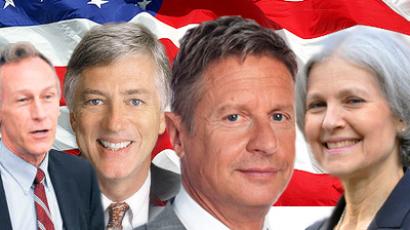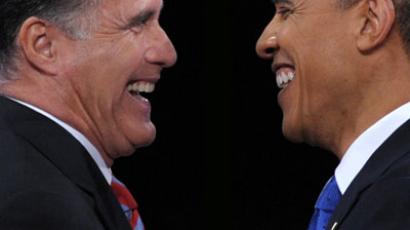Sleeper, awaken: ‘Disaffected voters future electorate for US opposition’
A third-party candidate won’t win the 2012 presidential race, but the huge number of politically inactive voters in the US could dramatically change future elections, New York-based anti-war activist and journalist Don De Bar told RT.
Third parties’ first and most important task should be to “leverage themselves into the power politics, De Bar said. “Keep in mind that half of the people in US that are eligible to vote – do not vote.”“There is a huge constituency out there that is disaffected, waiting for someone to speak to them,” De Bar explained, adding that it is necessary to bring suppressed or unheard voices into the political debate, as RT has done.
‘Little hope that third-party candidates can form viable coalition’
Though the third parties share similar views on domestic and international issues, the RT-hosted debates revealed how the opposition would likely be unable to unify to present a single candidate. The third-party candidates have a lot in common in “social policy, keeping the government out of people’s bedrooms, telephone lines and the internet connections,” De Bar said.They also agree on the need for defense spending cuts and ending US military involvement overseas, but it is unlikely these disparate opposition parties could form an effective coalition, he said.“There are many material differences between, say, [Green Party candidate] Jill Stein and the Libertarian candidate [Gary Johnson] she debated [at RT] this evening,” De Bar explained. “It would be difficult to imagine how to broker… a fusion candidate that would really speak to the constituencies to either of those parties.”
‘American elite controls the political discourse’
During the RT-hosted third-party presidential debates, the candidates focused heavily on US foreign interventions and military spending – issues that GOP candidate Republican Mitt Romney and Democratic candidate Barack Obama have never discussed at length.The bulk of the American taxpayer’s money is not invested in the culture or economy, “but rather pursue the interests of a very small elite that controls both the economy and the political sector,” De Bar said.De Bar argued that military spending in the US is not allowed as a topic of discussion in political discourse. The Democratic and Republican parties, in service to these elites and the media, likewise refuse to allow this issue to enter the debate.“The fundamental aspect of things, such as spending all that money on making war, the actual policy of making war, the neglect of workers needs and prosecution of workers and the assault on their rights as policy – that’s not a part of the discussion [between the leaders of presidential race] because that would lead to the people [of the elite] controlling the discourse [in the US],” De Bar said.














